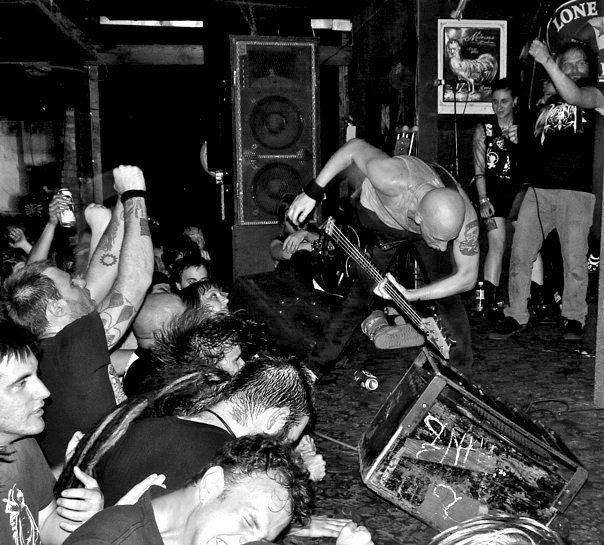
Tom Rusnak is a hardcore punk globetrotter actively co-creating names like RORSCHACH and AMBUSH but also having an episode in POSION IDEA. Perfect guy to talk about past and the bands in question. The interview was originally conducted for CHAOS IN MY HEAD zine #17. Cheers to Kuba and Bocian for making it happen.
SP: To start with, we are always interested to know how people become punks. How was it in your case?
Tom Rusnak: I was awkward as a kid (maybe I still am). I was not popular, didn’t understand current fashion trends, or any of the barometers kids were using to assign social value to themselves. Mainstream politics, music, sports, social events and social status made no sense to me. Before I was exposed to punk I felt diminished by all of the common mainstream social norms and methods of assigning value and status to individuals. A few of my friends, who were equally awkward and outcast discovered punk and hardcore before I did. Just being kids, skateboarding together and hanging around after school, or during the hot summer days, it was natural for us to share our interests. My mom introduced me to bands like The Alarm and The Jam, and through her friends I was listening to early U2, Kansas, Queen, stuff like that, so I was already interested in music. A common love of Skateboarding formed a bond between my lifelong friend Dean (Neal Witmer) and I. He introduced me to the first two Minor Threat EPs, and I was hooked. I felt like those records simultaneously affirmed that my world view was ok and that maybe it was mainstream society that was messed up. Maybe more importantly those records made me feel like I wasn’t alone. I didn’t really consider myself a punk, or hardcore kid at that point. Maybe I identified as a skateboarder for a year or two as I began listening to more and more punk and hardcore. I remember vividly the day I purchased Black Flag’s “Damaged”. It blew my mind. I listened to it over and over again. The shear raw energy and total abandon that came out of the stereo speakers catapulted me in a direction that would change my life forever. That was when I became a punk hardcore kid. That was the day I knew I wanted to play music. That was the day I knew for sure, that no matter what, I was going to decide for myself what is right, what is good and never let anyone constrict me with their rules.
SP: And being the age you are, with all your life experience, what does it mean to be a punk for you nowadays?
Tom Rusnak: Interesting question. I was discussing this topic recently with a couple of friends of mine, who I have known since the 80’s. We were discussing the contradicting aspects of our current state. Part of me has the same world view as I did when I was 17. I want to see the corporate oligarchy burned to the ground. On the other hand, there is a more recent part of me that is invested in the global economic system who wants to see his 401K continue to grow.
When I was younger I saw myself as static, or like a photograph. A picture of me on a skateboard. I am a skateboarder. A picture of me with my head shaved and moshing at an Agnostic Front show. I am a punk hardcore kid. A picture of me on stage with Rorschach. I am a hardcore bassist who makes music with my friends that we want to hear.
I think now that the photo still vision I used in the past to define myself doesn’t suffice. A better analogy would be a movie. Perhaps we are something more like the sum total of an entire film. I am not a guy who is doing an interview about his involvement in music. This is only a part of the story. In the end, if it is possible to quantify or define who we are, I would guess that that total is derived from the entirety of our lives. The reason this distinction between a static and a dynamic linear view of ourselves is important in relation to the question of what it means to be a punk to me now, is because regardless of what I do now, or in the future, some part of my story will always include how I thought of myself in the past. I am not sure that “1985 Thomas” would consider “2018 Thomas” as punk or hardcore. With that said, at some point in my 20’s I came to the conclusion that punk and hardcore didn’t define me, but rather, because of my deep involvement in that subculture, that I, along with all of my extended family of friends in the scene, became the defining factors of punk and hardcore. This was a very liberating epiphany for me. At this point in my life, at the ripe old age of 48, I vote with my money. I work for a company that focusses on operating in an ethical manner and produces a product that I am proud of and can stand behind. I couldn’t work for Nestle. I won’t buy products from Nestle. Something odd happened some years ago as I became older. I see a punk or hardcore kid and I identify with them and feel the same connection I did when I was 15. What changed is, they no longer pick me out of a crowd the way we used to pick out each other when I was younger.
SP: Coming back to your early days, how long did it take you to realize that you needed to be in a band in order to express yourself?
Tom Rusnak: In theory, 14 years. That was how old I was when I started making music with a couple of friends in their parents’ basement. With that said, I remember being eight or nine years old and standing with a tennis racquet in front of a mirror, pretending the racquet was a bass guitar and that I was Gene Simmons. So maybe some part of me knew as far back as then that I wanted to experience making music and performing with a crowd.
SP: Your most popular project is RORSCHACH. Is that true that you wanted to combine the sounds of Swans and DIE KREUZEN with hardcore punk? What was the origin of the band and the whole idea behind the band back then?
Tom Rusnak: The members of Rorschach had a wide variety of influences. I wouldn’t be comfortable saying that we had a unified concept built around the sound or style of any other bands. 99.9% of the music started with parts that Keith wrote, and I do feel comfortable saying that the one influence that was a constant for him was VOIVOD. Apart from that, I think we were all adding our own flavor to what Keith was cooking and really trying to create something that was all ours.
SP: Why did it last only 4 years then?
Tom Rusnak: We arrived at a point where our aspirations and ideals were growing in different directions. I
believe we would have stuck it out longer but Keith decided that he wanted to move in a different direction, work with other people and focus on a sound that would not have been Rorschach in his mind. There was probably a lot more to his reasoning than that, but absolutely without Keith, there could be no Rorschach.
SP: First RORSCHACH record “Remain Sedate” was released on Vermiform. For me it looked kind of natural, so why didn’t you stick with them with all your releases?
Tom Rusnak: Gern Blandsten is Charles’ label, which he started after the first record was released, so putting out “Protestant” with him was even more natural.
SP: The time RORSCHACH played was parallel to ABC NO RIO operations. How did a band from New Jersey get on stage in this club?
Tom Rusnak: ABC NO Rio was a great place for punks from all over county, and really the world to go play and meet like-minded people. The RORSCHACH people went there a lot to see shows and ABC NO RIO was more of a community than a club, so if you went to see a show, or play, you had the opportunity to become part of that family. I actually met my friends from RORSCHACH there when I played an ABC show with a band I played in called EVIL DEAN. Side note here, but the drummer from EVIL DEAN was the drummer of HUNGER, and his nickname is Dean. I like that you get that RORSCHACH was a New Jersey band. We got labeled as a New York hardcore band a lot, which was particularly funny to me, because I didn’t even live in Jersey. I lived in Pennsylvania during the time I played in RORSCHACH.
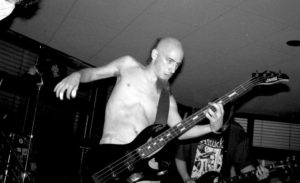
SP: Would you agree with the theory that RORSCHACH was a progressive band and together with BORN AGAINST or ECONOCHRIST you did things first time and it was crazy? Can you tell us about those two bands and your relation with them?
Tom Rusnak: BORN AGAINST are friends before anything else. I loved the band as a fan, but also love the people as friends. Super talented, smart and fun people. The last time RORSCHACH went down to play shows in California, I went down early to San Francisco to meet John Hiltz and pick up the van and gear simply because I wanted to spend a couple of days hanging out with him. We took HWY 101 down the coast, listened to great music and ate a lot of tacos. ECONOCHRIST I didn’t know as well. I met them through playing shows with them, but they were from the other coast so touring together was the foundation of our relationship. Regarding doing things for the first time, yes it was crazy. Not a lot of bands were playing anything along the lines of what we were doing back then. Even now, my wife who loves a lot of heavy music, can’t stand to listen to RORSCHACH or KISS IT GOODBYE. She calls it an aural assault, which is a huge compliment and makes me very happy.
SP: After RORSCHACH I saw you play in HUNGER in 1994 in Poznan, Poland. It was slow, brutal. Tell us about this climate and the HUNGER project.
Tom Rusnak: Ok, that show was a crazy show. That whole day and night were insane actually. Things happened on that date that I still won’t talk about to this day. The people who were there know. I remember realizing things were out of hand late that night, when one of the guitarists from HUNGER started lighting our money on fire and throwing it out of the window of a third story hotel room. I’ll tell you more about that day offline sometime.
SP: Was it after the HUNGER tour that you moved to Berlin and started to play bass with AMBUSH? How did the whole thing happen and why? How long were you there?
Tom Rusnak: Before the last tour that RORSCHACH did, Keith announced to the band that he would be leaving and effectively breaking up RORSCHACH at the end of the tour. I had become good friends with Tobias of AMBUSH the previous year when we toured in Europe. When I told him about the impending demise of RORSCHACH he proposed that I move to Berlin and join AMBUSH. I was already working on HUNGER and suggested that HUNGER go over to Europe to tour, and that I would stay there after the tour and live in Berlin. That is the short story. Common Cause Records was extremely helpful in facilitating the whole thing, as were my friends in AMBUSH.
SP: Am I right in saying that one can hear CODEINE inspired stuff on Pigs?
Tom Rusnak: You are extremely right. That album was heavily influenced by the bands CODEINE and TORTOISE, and the dark cold Berlin winter. I felt like the “Lach” LP was an attempt to connect with people and the scene we were part of. “Pigs” was more of an exploration into what we wanted to hear and probably a lot more self-indulgent.
SP: Can you elaborate on “Pigs” cover? We see sporty young people, maybe from the 30s. Are these photos of Hitler time youth? What does a terrified man look at?
Tom Rusnak: The photos are from the 50’s era. The concept was to have the side showing the women have the AMBUSH band name and the side with the weight lifting men on the beach say “Pigs”. Somewhere the idea got lost in translation with the graphic artist and the band name and record title got switched. Some people immediately drew the conclusion that we were referring to women as pigs and there were some repercussions because of that. For example Profane Existence refused to distribute the record in the U.S. I have since then wondered though, if part of why PE didn’t want to distribute the record was because we departed from the Neurosis-esq style and moved on to something that didn’t fit their pre-conceived notion of what our second full length should sound like.
SP: Did you play many gigs with AMBUSH? How did people react to it during the squatting crust era of this time?
Tom Rusnak: Yes, we toured a lot and frankly had a really warm reception all over Europe. Squatters, crust, metal, hardcore, punk folks, everyone seemed to be really supportive of what we were doing. Writing, touring and recording with those folks are some of the best memories of my life.
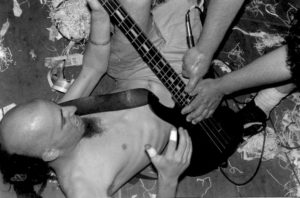
SP: Tell us about the Common Cause label which released your records, as well as ABC DIABLO or DYSTOPIA. Not much to be found about it these days. Who was behind the label?
Tom Rusnak: Michael Knopp was the fearless leader behind the Common Cause Empire. He is a great guy and continues to be a dear friend to this day. He loves music and was a tireless supporter of all of the bands on his label. Common Cause was truly a labor of love that Michael used as a venue to release records by bands that he cared about. ABC DIABLO was a great band that don’t get too much recognition over here in the States. And DYSTOPIA have been friends of mine for a long time. Great band. Great guys.
SP: What caused AMBUSH to split up?
Tom Rusnak: In the end, I am not in a position to say what caused AMBUSH to split up. After playing with them for three years I decided to move back to the United States to rejoin my friends Keith and Andrew to form KISS IT GOODBYE. AMBUSH continued on without me for a while. I did return for a few months to do a short tour of England and Ireland with AMBUSH around 98’ or so. I’ve never really talked much with my friends from AMBUSH about what finally ended the band. I suspect Tomas and Gunnar were done with touring and that was a big part of what ended the band.
SP: Are you in touch with them people? What are they up to?
Tom Rusnak: I am still in touch with Tobias as he is one of my closest friends. He is a very accomplished tattoo artist who actually did my first tattoo, which is taken from an AMBUSH tour poster. He works in Berlin and spends time there while also living in the country with his wife and daughters. He plays in the mighty HELGA BLOOM DYNASTY and released a solo record last year that is one of my top 10 favorite records of all time. I am not sure about the other fellows from AMBUSH. Now that I think about it, I need to ask around and see how they are doing.
SP: After AMBUSH came the EP with HITLER. That was a folk project of some sort, right?
Tom Rusnak: Yes. The recordings were Tobias and I playing pretty much everything. We did an AMBUSH tour in which we opened with the HITLER project and all the members of AMBUSH were incorporated into the live show. It went over really well in some venues and not so much in others. The name of the band was a very big bone of contention for a lot of people. We knew it would be and I think that was part of our motivation when we named the band.
SP: What made you go back to the US? Was it long you managed without a band?
SP: I was living in Berlin playing in AMBUSH when I received a phone call from Andrew of RORSCHACH. He told me that he and Keith were starting a new band with a friend of theirs who sang in a band called DEADGUY. I had never heard DEADGUY, but I was interested in playing with my old friends again, and also interested in visiting my home country again. So I agreed to fly back and see if it felt like a good fit. At the time my intention was to work with them for a little while and then return to Berlin to rejoin AMBUSH. But when I got back to New York, and began playing with my old friends, there was no going back. What those three guys were building with KISS IT GOODBYE was something I really wanted to be a part of. Frankly I love Tim Singers’ vocals. To this day he is one of my favorite vocalist and I was enamored with his lyrics and the way he delivered them. So I was never without a band during that transition. It was directly from AMBUSH to KISS IT GOODBYE.
SP: I guess you were a pretty popular band on Revelation and there was an option of Sub Pop. True? Also, stories about gigs with UNSANE and OBITUARY. How was it to play for you with death metal bands back in there day?
Tom Rusnak: I enjoyed being on Rev, and Sub Pop actually signed us for a 7” but after we recorded the songs for the record we let them know that we would not be touring anymore. With that news, Sub Pop sold the recording to Rev who released it posthumously. When Jonathan from Sub Pop saw KISS IT GOODBYE live, he commented to a friend of mine that he loved us so much that he was inspired to go home and play his guitar, which he hadn’t done in a long time. That was cool to hear from a guy who put out so many great records.
Touring with UNSANE was a dream come true. I absolutely love that band. They are unfuckwithable. I literally watched them every night for almost three months, and they were great every time they hit the stage. Funny, I don’t consider them death metal. I have always thought of them as hardcore.
Touring with OBITUARY was weird. They were very into the metal rock star sort of thing. I found the music to be subpar and really didn’t enjoy the guys on a personal level at all. I don’t think they were very impressed with us either. They kicked us off of the tour. The reason they gave was that we weren’t drawing enough people. I believe the truth was we didn’t like each other and that was why they dropped us. Then they asked us to come back on the tour later, as they were having trouble filling clubs, but we declined.
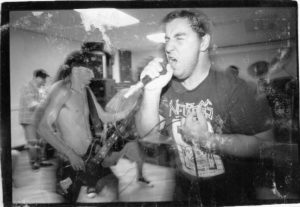
SP: So how was the co-operation with Revelation going?
Tom Rusnak: Revelation gave us total artistic freedom and treated us really well. Jordan really took care of
us. I am not sure that we fit into the standard Rev lineup but we could not have worked with better people. It was nice being on a label that could get our records into every record store on the planet and also give us serious tour support. Rev really went above and beyond with KIG. I can’t say enough good things about Jordan and the people who work at his label.
SP: There were more bands you played in … PLAYING ENEMY, KING BLACK ACID, all different sorts of noise….
Tom Rusnak: PLAYING ENEMY was in a period of my life where I was thinking that maybe playing in a band wasn’t so much for me anymore. I really enjoyed the writing process and playing together in the practice room. Playing shows had lost its luster for me. Also, Andrew and Demian were anxious to record the first LP almost immediately after I joined the band. I really didn’t feel that I had a chance to fully cook the bass lines. That is the reason I suggested that we called that record “Cesarean”. We were pulling that one out of the womb before it was ready, at least in my opinion. I really love PLAYING ENEMY’s second record “You Were My City”. I didn’t play on that one. My friend Shane was the bassist that band really needed and when he joined it all really began to click. KING BLACK ACID was interesting. I got to work on some styles I hadn’t really tried before. And I got to work with some seriously talented musicians. Jeffery Trapp is still a friend of mine and one of the most talented musicians on the planet. It was fun, but felt a little bit constricting.
SP: Your punk CV also includes a line: POISON IDEA – bass guitar. How did you end up there?
Tom Rusnak: A friend of mine ran into Jerry A at a bar and the topic of POISON IDEA needing a bassist came up. My name was mentioned, contact information was exchanged and I ended up on the phone with Jim, who I already knew from his amplifier repair shop. I grew up on the east coast and POISON IDEA hadn’t really been a big influence for me. I was hungry at that point to play, and I liked the PI music I was finding. So I learned a few songs and tried out. Jerry A and I hit it off well enough and I ended up playing with them for a while.
SP: And you are now based in Portland, right? Are you still tempted to play in a band? What are your plans?
Tom Rusnak: Actually, about two years ago I moved to the Oregon coast to a beautiful little town with a
great community. I still go into Portland a lot to see shows and soak up the city. I have been playing a lot of solo bass stuff at home with effects and looping pedals. Also I have been collecting stories from the course of my life, like the time I got into a fight with Pennywise, or the shenanigans that went on with POISON IDEA. I am in the process of building a set that I can play solo live. I would love to do gigs with just me and my bass.
SP: How about the US hardcore punk scene of the 90s and now. What striking differences do you see both, in music styles, the DIY ethics and ideology behind it (ie. animal rights, etc)
Tom Rusnak: Musically, I think that there is an amazing amount of great music still pouring out of the hardcore punk scene. The landscape has changed a lot, so what worked logistically for bands 20 or 30 years ago is vastly different from what works now. Obviously the internet changed things for good and bad. As far as ideologies, political stances, ethics, and all of the other things that may or may not define a band, at this stage of the game, I see all of that as peripheral to the music. If your band is all vegan and that is expressed in your music that is great. If your band only writes songs about hockey, well, that is cool too. I guess I am happy to say that while hardcore punk has developed, it is just as vibrant and as exciting as ever.
SP: Thank you for taking your time to answer the questions. Is there anything that you wanted to add at the end?
Tom Rusnak: Thanks for taking the time to talk to me. It is fun to look back at the past from the perspective of the present.
